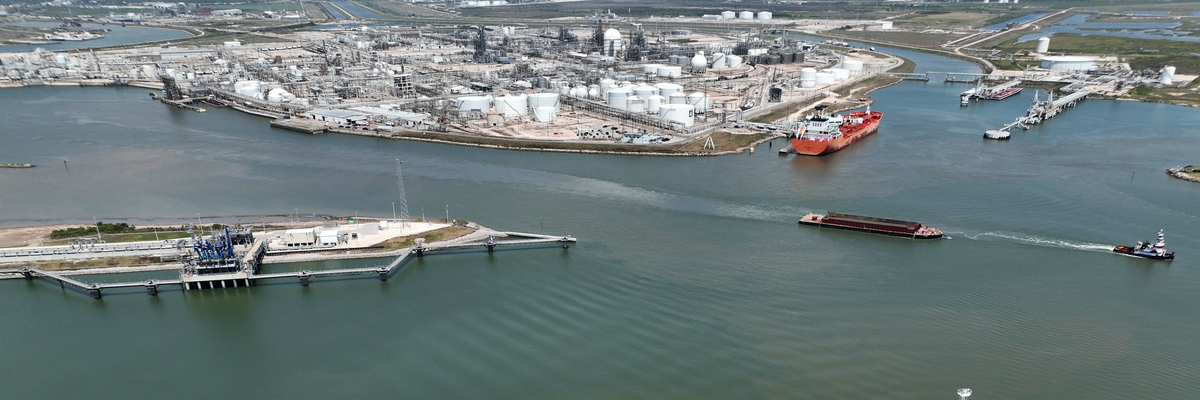As Republican President-elect Donald Trump prepares to further accelerate already
near-record liquefied natural gas exports after taking office next week, a report published Friday details how soaring U.S. foreign LNG sales are "causing price volatility and environmental and safety risks for American families in addition to granting geopolitical advantages to the Chinese government."
The report,
Strategic Implications of U.S. LNG Exports, was published by the American Security Project, a Washington, D.C.-based think tank, and offers a "comprehensive analysis of the impact of the natural gas export boom from the advent of fracking through the Russian invasion of Ukraine, and provides insight into how the tidal wave of U.S. exports in the global market is altering regional and domestic security environments."
According to a summary of the publication:
The United States is the world's leading producer of natural gas and largest exporter of liquefied natural gas (LNG). Over the past decade, affordable U.S. LNG exports have facilitated a global shift from coal and mitigated the geopolitical risks of fossil fuel imports from Russia and the Middle East. Today, U.S. LNG plays a critical role in diversifying global energy supplies and reducing reliance on adversarial energy suppliers. However, rising global dependence on natural gas is creating new vulnerabilities, including pricing fluctuations, shipping route bottlenecks, and inherent health, safety, and environmental hazards. The U.S. also faces geopolitical challenges related to the LNG trade, including China's stockpiling and resale of cheap U.S. LNG exports to advance its renewable energy industry and expand its global influence.
"When comparing natural gas and renewables for energy security, renewables generally offer greater long-term energy security due to their local availability, reduced dependence on imports, and lower vulnerability to geopolitical disruptions," the report states.
American Security Project CEO Matthew Wallin said in a statement that "action needs to be taken to ensure Americans are insulated from global price shocks, the impacts of climate change, and new health and safety risks."
"Our country must also do more to protect its interests from geopolitical rivals like China that subsidize their growth and influence by reselling cheap U.S. LNG at higher spot prices," Wallin asserted. "U.S. LNG has often been depicted as a transition fuel, and our country must ensure that it continues working towards that transition to clean sources instead of becoming dependent on yet another vulnerable fuel source."
Critics have
warned that LNG actually hampers the transition to a green economy. LNG is mostly composed of methane, which has more than 80 times the planetary heating power of carbon dioxide during its first two decades in the atmosphere.
Despite President Joe Biden's 2024
pause on LNG export permit applications, his administration has presided over what climate campaigners have called a "staggering" LNG expansion, including Venture Global's Calcasieu Pass 2 export terminal in Cameron Parish, Louisiana and more than a dozen other projects. Last month, the U.S. Department of Energy acknowledged that approving more LNG exports would raise domestic energy prices, increase pollution, and exacerbate the climate crisis.
In addition to promising to roll back Biden's
recent ban on offshore oil and gas drilling across more than 625 million acres of U.S. coastal territory, Trump—who has nominated a bevy of fossil fuel proponents for his Cabinet—is expected to further increase LNG production and exports.
A separate report
published Friday by Friends of the Earth and Public Citizen examined 14 proposed LNG export terminals that the Trump administration is expected to fast-track, creating 510 million metric tons of climate pollution–"equivalent to the annual emissions of 135 new coal plants."
While campaigning for president, Trump
vowed to "frack, frack, frack; and drill, baby, drill." This, as fossil fuel interests poured $75 million into his campaign coffers, according to The New York Times.
"This research reveals the disturbing reality of an LNG export boom under a second Trump term," Friends of the Earth senior energy campaigner Raena Garcia said in a statement referring to her group's new report. "This reality will cement higher energy prices for Americans and push the world into even more devastating climate disasters. The incoming administration is poised to haphazardly greenlight LNG exports that are clearly intended to put profit over people."

